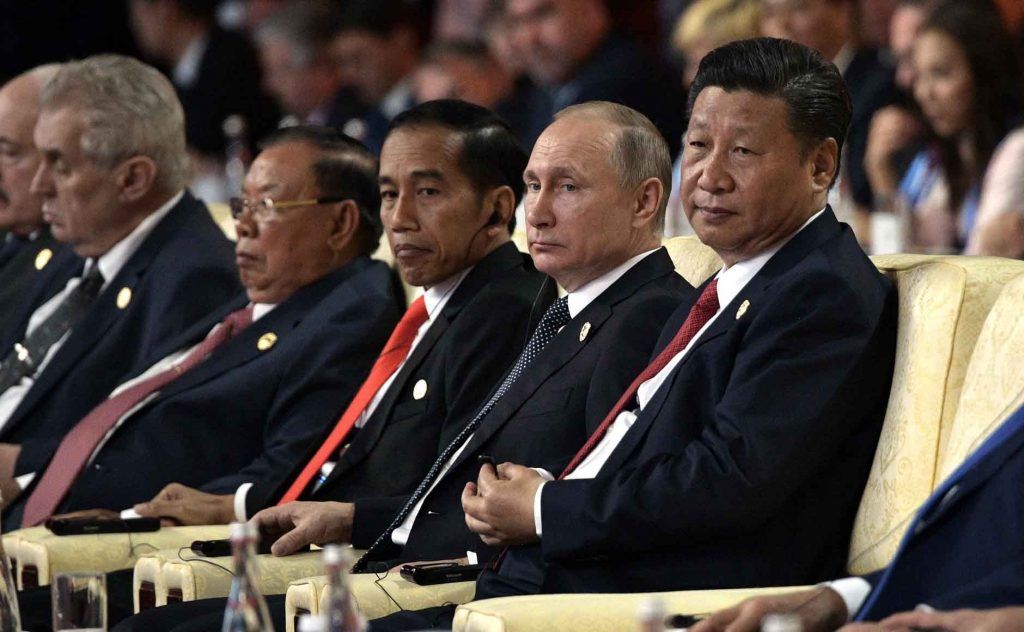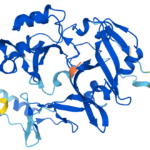Infodemic Monitor
Politics, race, and religion: Pandemic misinformation courses through the Southeast Asian internet
By Jan Oledan, Nicola Bariletto, Saiful Salihudin, Mehulika Sitepu, Jacob N. Shapiro, January 25, 2021
 Indonesia's President Joko Widodo (third from right) sits with other world leaders. Credit: The Russian Presidential Press and Information Office via Wikimedia Commons. CC BY 4.0.
Indonesia's President Joko Widodo (third from right) sits with other world leaders. Credit: The Russian Presidential Press and Information Office via Wikimedia Commons. CC BY 4.0.
From tales of allegedly dwindling food stockpiles in Singapore to Indonesian land supposedly being traded to China for precious supplies of vaccine, false narratives about COVID-19 have swirled around the Southeast Asian internet for months.
Disinformation in the region is not a new phenomenon. During the 2014 Indonesian election, Islamist groups targeted current President Joko Widodo and falsely claimed he was a non-Muslim of Chinese lineage. Online troll armies notoriously helped propel Philippines President Rodrigo Duterte to victory in his 2016 campaign. Concerns about misinformation have led governments to implement highly controversial legislation in Thailand and Malaysia.
Now, the misinformation ecosystem in Southeast Asia continues to thrive in the ongoing coronavirus pandemic.
COVID-19 is spreading at substantially different rates across the region’s countries. Case numbers remain low in Singapore and Thailand, while cases in Malaysia, Indonesia, and the Philippines are at a high plateu or rising. Public emergency responses have come in different flavors, as well. Initially, Singaporean, Malaysian, and Thai authorities reacted swiftly by implementing various lockdown measures, which were broadly supported and relatively successful in containing the virus. Early re-openings in Indonesia were heavily criticized in light of the worrying infection rates. And public health measures in the Philippines are still constrained by insufficient testing and tracing capacity.
Unsurprisingly, politically motivated misinformation has incorporated COVID-19 as countries grapple with the pandemic. In the Philippines, common false narratives involve foreign figures praising Duterte and his government’s response, while discrediting his political opposition through misattributed quotes and graphics. Civil society groups that have pushed back against Duterte’s strongman government have been targetted with misleading Facebook posts that make it appear they violated quarantine rules.
In Malaysia, opposition leaders shared a chart of false unemployment statistics, claiming they were the highest in the country’s history. In another instance, an old group photo of members of parliament congregating in close proximity to each other and not wearing masks also made the rounds on social media. Posts falsely claimed the scene took place during the pandemic.
In neighboring Indonesia, there were plenty of narratives surrounding President Joko Widodo, from rumors that he and his cabinet members were socializing without proper distancing measures to accusations of bartering Indonesian land with Chinese companies in exchange for vaccines.
In Singapore, false stories on the government's inability to respond effectively to the pandemic began as early as January 2020, with claims that the city-state was running out of face masks or that the city-state was unable to trace new sources of the virus, which the government disputed. A Facebook video with thousands of views claimed that members of the opposition Workers' Party held a rally in July during the pandemic when, in fact, the video was of a victory parade in 2012.
COVID-19 misinformation in the region also has a racial and anti-immigrant undertone. Stories on WhatsApp in Singapore reported that undercover authorities were conducting spot checks to prevent gatherings during Eid, a Muslim holiday. The stories were false, according to the fact-checking operation Black Dot Research, which investigates claims on Singaporean social media. Migrant workers, who tested postiive for the virus, have been falsly accused in misleading Facebook posts for not following isolation rules. They were also accused, without evidence, of intentionally getting sick to stay in the country. Singapore’s significant expat population was also targeted with false stories about how they were treated harshly for flouting the country’s sudden lockdown response.
False narratives about ethnic Rohingya refugees in Malaysia reflects anti-immigrant sentiment in the country.
Early in the pandemic, Malaysian authorities turned away a boat carrying over 200 Rohingya refugees; in another case, migrants were rounded up, sparking a massive public debate that dominated social media and news channels in Spring 2020. At the time, there were widespread false reports that COVID-19-positive Rohingya refugees attended mass religious gatherings, that migrants flouted lockdown rules by praying together, and that migrants received financial assistance to stay in Malaysia.
In Indonesia, false narratives have taken on an anti-Chinese sentiment. False rumors spread about the government facilitating an influx of Chinese workers who supposedly had the underlying motive of wiping out the nation by deliberately spreading the virus. Narratives also critiqued and commented on Indonesia’s agreement to conduct clinical trials for a Chinese coronavirus vaccine. Some false messages claimed that Indonesia was the only country willing to be "the guinea pig" and that China was running out of monkeys to test on and had turned to the Indonesian population instead.
False narratives also followed religious lines, reflecting the religious diversity of the region. Malaysia and Indonesia, which are close in geography, culture, religion, and language, saw the spread of similar false narratives and stories. Some claimed that Islam was the answer to the pandemic. A Facebook video with an Indonesian caption purportedly showed musicians of various religions reciting the Islamic names of god, supposedly a sign that people had finally gotten wise about how to get through the pandemic. In reality, the clip was repurposed video from an earlier concert in Istanbul. In a similar vein, another old video—this time shot in Azerbaijan—falsely claimed to show the first Islamic call to prayer in Spain in 500 years. According to AFP, the Indonesian caption read: “After it was prohibited in Spain (Andalusia) 500 years ago, azan was called for the first time yesterday (March 28, 2020) in the land where Islam used to be victorious, and this happened when the coronavirus crisis becomes global.” The video was shared more than 600 times.
One widely shared conspiracy theory that spread on Indonesian social media proposed that the pandemic was manufactured by the global elite to stop the rise of Islam. Another WhatsApp message in Muslim-majority Malaysia warned Muslims that the pandemic was a sign of the end of times and that believers ought to repent.
The trajectory of coronavirus cases, lockdown measures, and misinformation narratives reflects the diverse history, politics, and culture of Southeast Asia. Misinformation has adapted with the times.
Editor’s note: This is the eighth installment in a series by researchers working with Princeton University’s Empirical Studies of Conflict’s COVID-19 disinformation project. Led by professor Jacob Shapiro and Samikshya Siwakoti—a research specialist for the conflict studies project—students at Princeton and other universities are cataloguing the various false narratives cropping up online about the COVID-19 pandemic. Readers can see the team’s disinformation spreadsheet here.
Together, we make the world safer.
The Bulletin elevates expert voices above the noise. But as an independent nonprofit organization, our operations depend on the support of readers like you. Help us continue to deliver quality journalism that holds leaders accountable. Your support of our work at any level is important. In return, we promise our coverage will be understandable, influential, vigilant, solution-oriented, and fair-minded. Together we can make a difference.
Keywords: Coronavirus, Disinformation, Infodemic Monitor, Southeast Asia, fact-checking
Topics: Analysis, Disruptive Technologies
Share: [addthis tool="addthis_inline_share_toolbox"]




















Write more, thats all I have to say. Literally, it seems as though you relied on the video to make your point. You clearly know what youre talking about, why throw away your intelligence on just posting videos to your site when you could be giving us something enlightening to read?